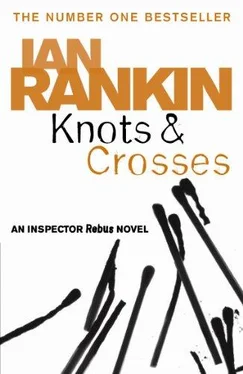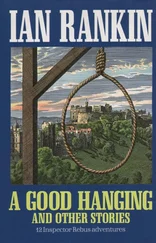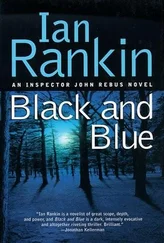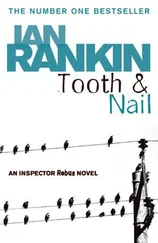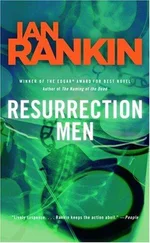He stayed hidden, she surmised, because he was on the move, swiftly and methodically moving through the streets and bars of Edinburgh in search of his prey, knowing that when found, the prey would turn hunter once more.
But Gill went on trying, shivering now and then when she thought of her lover’s grim and horrific past, and of the mentality of those who decided that such things were necessary. Poor John. What would she have done? She would have walked right out of that cell and kept on walking, just as he had done. And yet she would have felt guilty, too, just as he had felt guilt, and she would have put it all behind her, scarred invisibly.
Why did the men in her life have to be such complicated, fraught, screwed-up bastards? Did she attract the soiled goods only? It might have been humorous, but then there was Samantha to think about, and that wasn’t funny at all. Where did you start looking if you wanted to find a needle? She remembered Superintendent Wallace’s words: they’ve got the same boss we have. That was a truth well worth contemplating in all its complexity. For if they had the same boss, then perhaps a cover-up could be arranged at this end, now that the ancient and terrible truth had surfaced again. If this got into the papers, all hell would be let loose at every level of the service. Perhaps they would want to co-operate in hushing it up. Perhaps they would want Rebus silenced. My God, what if they should want John Rebus silenced? That would mean silencing Anderson, too, and herself. It would mean bribes or a total wipe-out. She would have to be very careful indeed. One false move now might mean her dismissal from the force, and that would not do at all. Justice had to be seen to be done. There could be no cover-ups. The Boss, whoever or whatever that anonymous term was meant to imply, would not have his or its day. There had to be truth, or the whole thing was a sham, and so were its actors.
And what of her feelings towards John Rebus himself, spotlit on the reddened stage? She hardly knew what to think. The notion still niggled at her that, no matter how absurd it might appear, John was somehow behind this whole thing: no Reeve, the notes sent to himself, jealousy leading him to kill his wife’s lover, his daughter now hidden somewhere — somewhere like that locked room.
It was hardly to be contemplated, which, considering the way the whole thing had gone thus far, was why Gill contemplated it very hard indeed. And rejected it, rejected it for no other reason than that John Rebus had once made love to her, once bared his soul to her, once clasped her hand beneath a hospital blanket. Would a man with something to hide have become involved with a policewoman? No, it seemed wholly unlikely.
So, again, it became a possibility, joining the others. Gill’s head began to pulse. Where the hell was John? And what if Reeve found him before they found Reeve? If John Rebus was a walking beacon to his enemy, then wasn’t it crazy for him to be out there on his own, wherever he was? Of course it was stupid. It had been stupid to let him walk out of the room, out of the building, vanishing like a whisper. Shit. She picked up the telephone again and dialled his flat.
John Rebus was moving through the jungle of the city, that jungle the tourists never saw, being too busy snapping away at the ancient golden temples, temples long since gone but still evident as shadows. This jungle closed in on the tourists relentlessly but unseen, a natural force, the force of dissipation and destruction.
Edinburgh’s an easy beat, his colleagues from the west coast would say. Try Partick for a night and tell me that it’s not. But Rebus knew different. He knew that Edinburgh was all appearances, which made the crime less easy to spot, but no less evident. Edinburgh was a schizophrenic city, the place of Jekyll amp; Hyde sure enough, the city of Deacon Brodie, of fur coats and no knickers (as they said in the west). But it was a small city, too, and that would be to Rebus’s advantage.
He hunted in the hard-man’s drinking dens, in the housing estates where heroin and unemployment were the totem kings, for he knew that somewhere in this anonymity a hard man could hide and could plan and could survive. He was trying to get inside Gordon Reeve’s skin. It was a skin sloughed many times, and Rebus had to admit, finally, that he was further away from his insane, murderous blood-brother than ever before. If he had turned his back on Gordon Reeve, then Reeve was refusing to show himself anyway. Perhaps there would be another note, another teasing clue. Oh, Sammy, Sammy, Sammy. Please God let her live, let her live.
Gordon Reeve had levitated right out of Rebus’s world. He was floating overhead, floating and gloating in his new-found power. It had taken him fifteen years to accomplish his trick, but my God what a trick. Fifteen years within which time he had probably changed his name and appearance, taken on a menial job, researched Rebus’s life. How long had this man been watching him? Watching and hating and scheming? All those times that he had felt his flesh creep for no reason, that the telephone had rung without a voice behind it, that small, easily forgotten accidents had occurred. And Reeve, grinning above him, a little god over Rebus’s destiny. Rebus, shivering, entered a pub for the hell of it and ordered a triple whisky.
‘It’s quarter-gills in here, pal. Are you sure you want a treble?’
‘Sure.’
What the hell. It was all one. If God swirled in his heaven, leaning down to touch his creatures, then it was a curious touch indeed that he gave them. Looking around, Rebus stared into a heart of desperation. Old men sat with their half-pint glasses, staring emptily towards the front door. Were they wondering what was outside? Or were they just scared that whatever was out there would one day force its way in, pushing into their dark corners and cowered glances with the wrath of some Old Testament monster, some behemoth, some flood of destruction? Rebus could not see behind their eyes, just as they could not see behind his. That ability not to share the sufferings of others was all that kept the mass of humanity rolling on, concentrating on the ‘me’, shunning the beggars and their folded arms. Rebus, behind his eyes, was begging now, begging to that strange God of his to allow him to find Reeve, to explain himself to the madman. God did not answer. The TV blared out some banal quiz show.
‘Fight Imperialism, fight Racism.’
A young girl wearing a mock-leather coat and little round glasses stood behind Rebus. He turned to her. She had a collecting tin in one hand and a pile of newspapers in the other.
‘Fight Imperialism, fight Racism.’
‘So you said.’ Even now he could feel the alcohol working on his jaw muscles, freeing them of stiffness. ‘Who are you from?’
‘Workers Revolutionary Party. The only way to smash the Imperialist system is for the workers to unite and smash racism. Racism is the backbone of repression.’
‘Oh? Aren’t you confusing two entirely different arguments there, love?’
She bristled, but was ready to argue. They always were.
‘The two are inextricable. Capitalism was built on slave labour and is maintained by slave labour.’
‘You don’t sound much like a slave, dear. Where did you get that accent? Cheltenham?’
‘My father was a slave to capitalist ideology. He didn’t know what he was doing.’
‘You mean you went to an expensive school?’
She was bristling now all right. Rebus lit a cigarette. He offered her one, but she shook her head. A capitalist product, he supposed, the leaves picked by slaves in South America. She was quite pretty though. Eighteen, nineteen. Funny Victorian shoes on, tight pointed little things. A long, straight black skirt. Black, the colour of dissent. He was all for dissent.
Читать дальше
